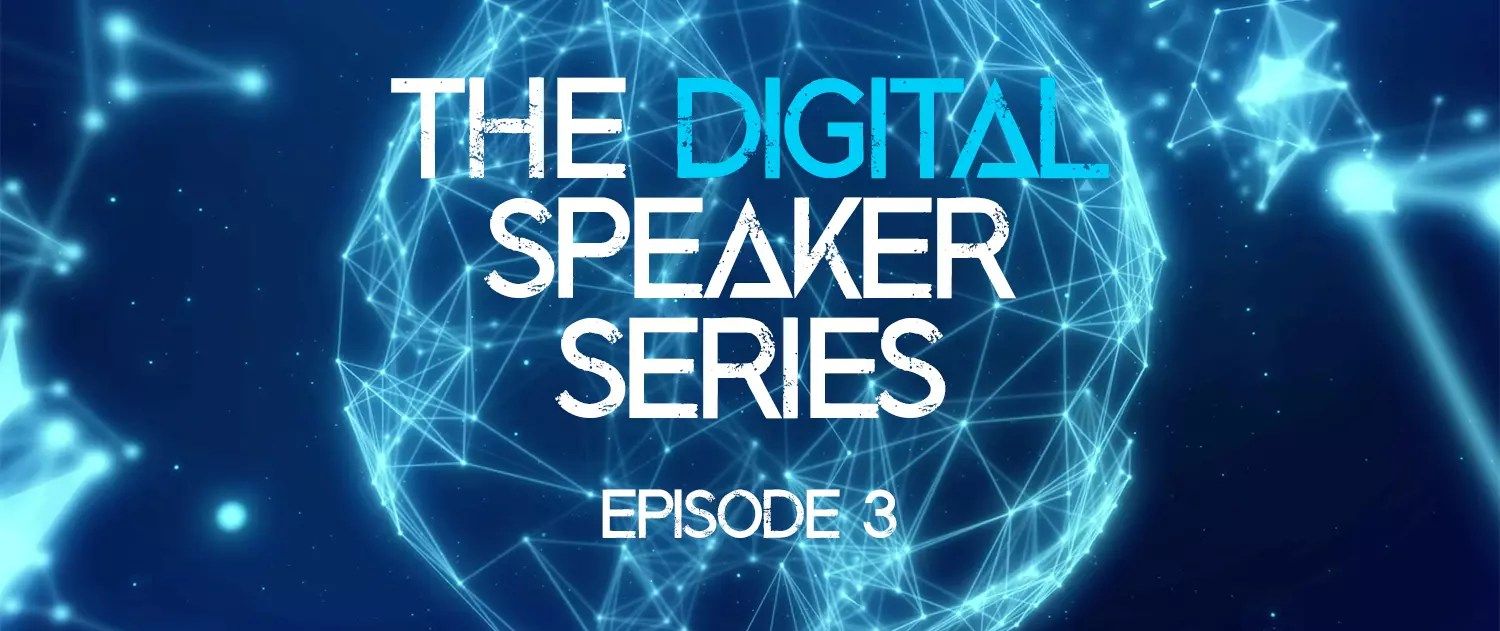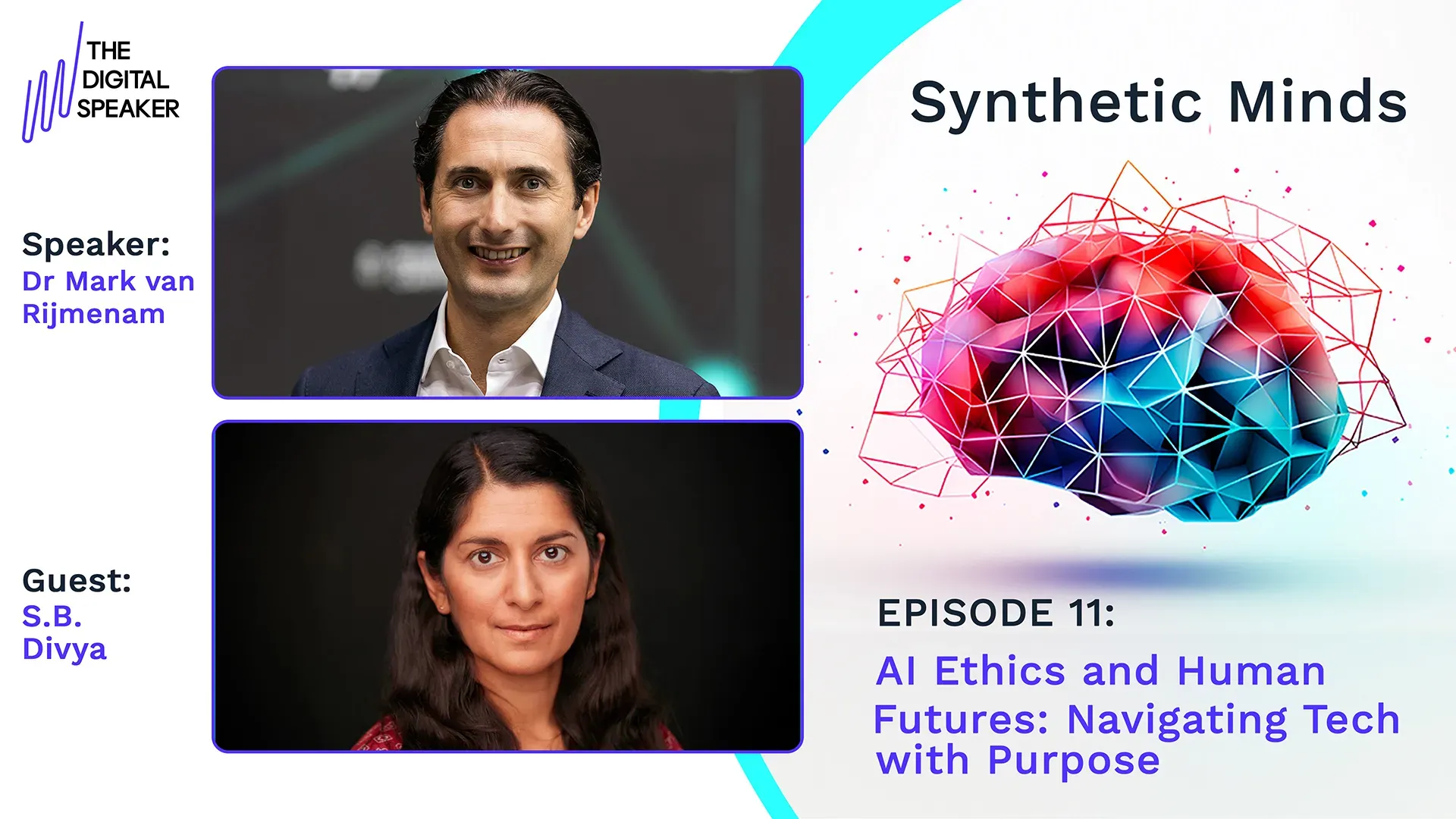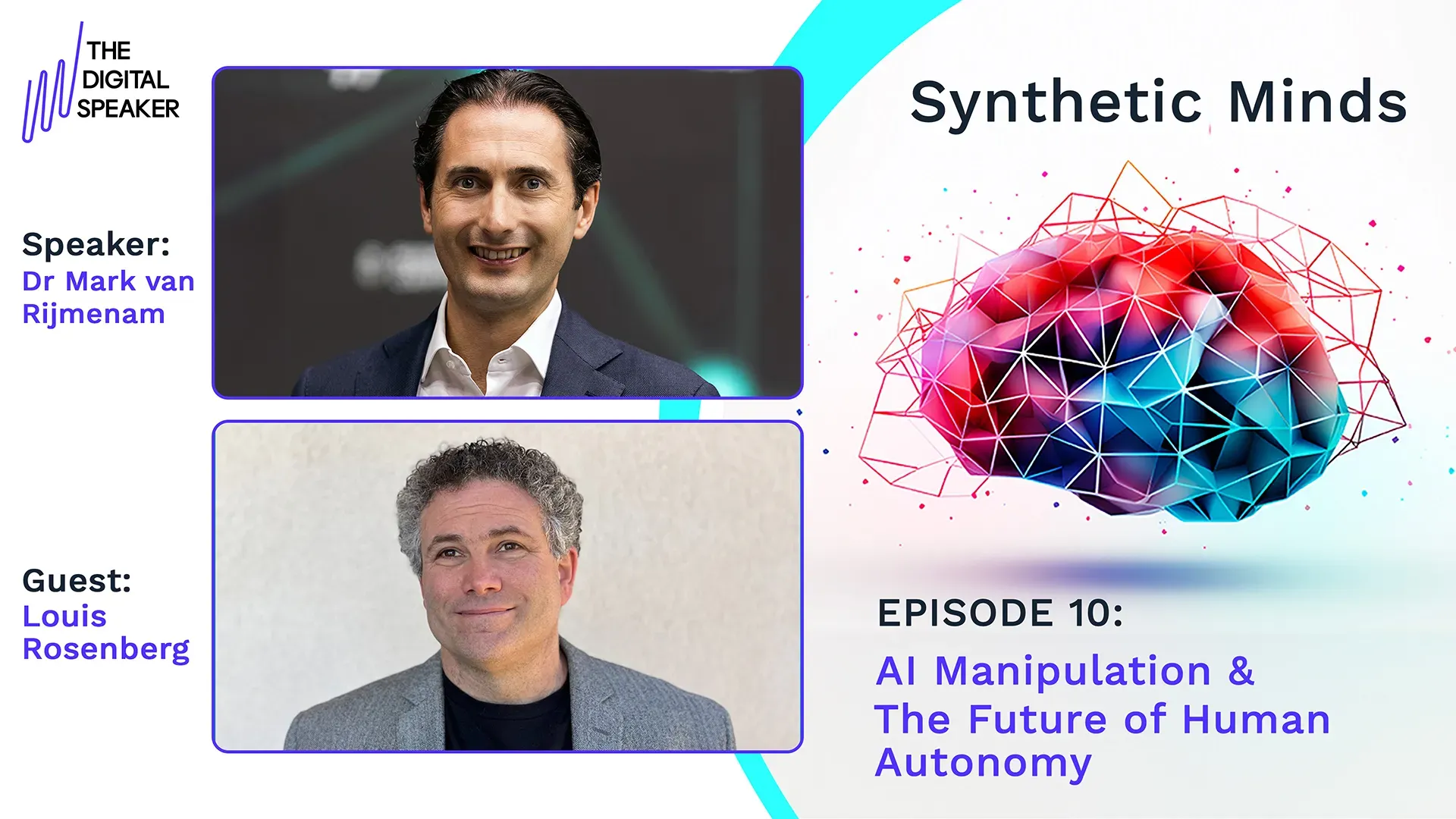The Digital Speaker series - The Tech Journal - EP03

Hello everyone and welcome to the Tech Journal. My name is Mark van Rijmenam, and I am the Digital Speaker. In this series, I project my digital twin into cyberspace to bring you the latest-and-greatest from the digital world. I cover all the latest digital news, from blockchain and crypto through to quantum computing and AI. I also always try to take it a step further and look into what these digital innovations mean for our personal and professional lives.
Let’s take a quick look at what I’m covering on today’s show.
Amazon finds itself in hot water with the EU after potentially violating antitrust laws. To censor or not to censor? That is the question on everyone’s lips right now as multiple powers play with the idea of censoring the digital sphere. But first, our data is being pillaged before our very eyes, but who is standing up for us? Let’s take a look.
So, get comfortable, sit back, and let us start speaking digital.
You can either view the episode above or view it on Vimeo, YouTube or listen to it on Anchor.fm, Soundcloud or Spotify. Below is the transcript of the video if you prefer to read the episode.
The Data Wars
Since the dawn of digitalisation, a war has been waged for a resource more valuable than gold but more abundant than Facebook users. Data. Data has proven so valuable that the tech giants built their empires upon it.
But our governments have not been standing idly by, no. Over the past couple of years, the EU has been ramping up their efforts to protect the rights and data of EU citizens. In 2018, the EU brought the EU General Data Protection Regulation (GDPR) into law, upheld by the DPC, the lead European Union regulator.
The DPC used these regulations to investigate Instagram recently over reports that they failed to protect user data, allowing children’s emails and phone numbers to be made public, breaking privacy laws.
A US-based data scientist, David Stier, brought this to the public’s attention. Last year David analysed almost 200,000 Instagram profiles, then, with the data he found, estimated that at least 60 million profiles, belonging to minors under the age of 18, were given an easy way to convert their profiles into business accounts, which then makes their phone numbers and email addresses public information.
Facebook, Instagram’s parent company, rejected the claims but was cooperating with the DPC.
This accusation comes amidst another claim that in May 2019, 49 million Instagram users’ contact details were stored in India’s unsecured online database, leading to accusations of mishandling personal information.
Facebook’s data abuses don’t just stop there, though.
Facebook & Cambridge Analytica Sitting In A Tree…
Facebook recently found itself being sued for a second time over its links to Cambridge Analytica. Once again, they are being accused of sharing user data with the company without the user’s consent, breaching EU law.
The group action lawsuit, which human rights campaigner, Alvin Carpio, brought to Facebook, is the largest to date, representing almost all the one point one million UK users thought to have had their data shared with Cambridge Analytica.
The case aims to, and I quote, “redress and [seek] compensation for the persistent mass misuse of personal data”.
The suit alleges that by taking data without consent, Facebook failed to meet its legal obligations under the Data Protection Act 1998.
With all this in mind, securing data has never been one of Facebook’s strong points. The company was charged half a million pounds, so roughly 700,000 dollars, back in 2019 for its involvement in the Cambridge Analytica scandal.
If we all think back to 2018, Facebook shared data belonging to 87 million users with the political consultancy, Cambridge Analytica, without user consent.
If anything, the 2018 scandal stands only as a testament to how ineffective half a million-pound fines when trying to deter a company who made 70 billion dollars the same year.
Differential Privacy
But what can we do then? Constant court battles are a lengthy and expensive process which does not guarantee results, and even when it does, the fines are mere pocket change for the companies involved.
A possible solution being tried is Differential privacy.
Simply, Differential Privacy will make data impossible to attribute to an individual.
The goal is to maximize the use of data while not harming an individual’s privacy, allowing organisations and groups to collect and share general data about demographics while keeping the raw data inaccessible and the identities of the individuals private.
The system was trialled in the 2020 American Census in its largest application to date.
While this seems like a good compromise, I can not see an end to this while we, the users, are still not asked for consent.
And we won’t be given that option willingly, as the option to consent implies power. Something the tech giants are doing everything possible to keep in their hands alone, breaching antitrust laws.
Trust the Antitrust Laws
With the digital world almost having completed its transformation from a frontier to a colony, it is beginning to look more like an end-game monopoly board.
The EU has hit Amazon with formal antitrust charges over its treatment of 150,000 European merchants.
The company is accused of abusing data by using live third-party vendor data when deciding business strategy in a way that “appears to distort genuine competition”.
Separately, German Competition Authorities have been investigating Amazon’s use of data for two years now but have yet to bring charges.
The investigation into Amazon comes after the Competition Issues EU commissioner recently fined Google nearly ten billion dollars for breaching antitrust laws and opened a twin antitrust investigation into Apple.
Initially, the US criticised the EU for coming down on American companies; however, since then, the U.S. Department of Justice sued Google after a 16-month investigation into the tech-giant.
They found that the deal between Google and Apple, where Google paid eight to twelve billion dollars to be the default search engine on Apple products, breached antitrust laws.
In the meantime, Apple has already begun developing its own search engine to replace Google on its devices, possibly setting the scene for another future antitrust breach.
The outcomes of these cases will quite literally shape the digital world’s future, as the power and reach of the tech giants is put to the test.
If the monopolies succeed, there is no limit to the control they would have over public discourse, reaching heights print-media never even dreamt of.
Unlimited control over what people see or do not see would be theirs.
To Censor Or Not To Censor
One inescapable fact about digitalisation is that while it gives people access to more information than at any other point in history, it also gives private businesses the power to censor more than at any other point in history.
First, Facebook announced it will extend its ban on political ads in the US going into 2021, in an attempt to hold back the surge of misinformation post-American election.
Twitter and Facebook began taking an active role in self-censorship after Facebook found itself in front of major world governments having to explain why it lets misinformation, including misleading political ads, go unchallenged on its platform.
Not everyone is on board with Facebook’s self-censorship though, as US lawmakers recently voted to subpoena Mark Zuckerberg and Jack Dorsey, the chief executives of Facebook and Twitter, after both platforms censored “conservative viewpoints”.
Ironically, while American lawmakers seek to stop private companies from censoring, the Thai government seeks to force digital news and media outlets to self-censor as social tensions tighten.
In Thailand, pro-democracy and anti-monarchy posts are the target of censorship. Where the authorities can not force Facebook to oblige, individuals find themselves in prison for social media posts.
News organisations, from the BBC to the Bangkok Post, found themselves censored online mid-publication.
Reporters from Khaosod English also reported police using signal jammers to stop Facebook live videos.
Thailand is a great model for what digital censorship really looks like. Right now, security officers are looking into 300,000 URLs of individual social media users and websites publishing controversial opinions.
The Thai authorities went so far as to arrest a handful of students for Facebook posts. At the same time, in an unrelated case, they imprisoned an American for two months for writing a series of bad reviews on Tripadvisor.
While the Americans aim for complete digital freedom and the Thais look to restrict speech, the Indian Government is looking to install a similar version of Chinese digital censorship.
The Indian government has ordered that all digital news, social media and video streaming platforms, like Netflix and Amazon Prime, need to be subject to state regulation, stoking fears of increased censorship of digital media.
Digital rights activist and founder of MediaNama, Nikhil Pahwa, recently said, “…the Ministry of Information and Broadcasting – essentially India’s Ministry of Truth – [is] now in a position to regulate online news and entertainment, we will see a greater exercise of government control and censorship.”
It does not stop there though, as the UK government also found itself in the censorship debate. British politicians have made calls to force social media giants, like Facebook, to censor anti-vaccination claims as misinformation on the platforms runs riot.
The concept of digital censorship is a difficult one to consider. On the one hand, we in the West have freedom of speech which stretches to the digital sphere, but this new sphere gives anyone unfettered access to platforms capable of reaching millions of people.
Is increased censorship necessary as the digital world gives increased access to global platforms? It will certainly open Pandora’s box of censorship.
An uncontained spread of uncensored misinformation can do untold damage, while at the same time a hyper-censored society lacks freedom.
Society needs to be careful that through censorship, or the lack thereof, we do not lose our freedoms. And so we must limit the power of governments and corporations ability to censor while affording the same organisations enough power to maintain order.
The censorship tightrope is a high and narrow one; we must tread a fine line, or risk falling to one extreme.
And on that rather sombre digital note, that is all we have time for today. I have been your host, Mark van Rijmenam, The Digital Speaker, and this has been The Tech Journal.
For other episodes or the audio version, please follow the below links:





























